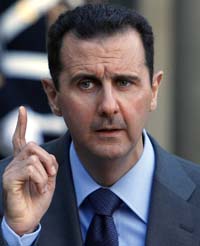On August 28, President Bashar al-Assad approved a new media law that purportedly upholds freedom of expression and bans the arrest of journalists. Yet less than a week later, on Saturday, a Syrian journalist and contributor to the pan-Arab daily Al-Hayat was arrested, CPJ reported. Just two days before the endorsement of the law, Syrian cartoonist Ali Ferzat was brutally attacked by masked assailants. A close look at the legislation, Decree No. 108, suggests the Assad regime is simply paying lip service to reform.
Local journalists say there is nothing really “new” about the media law and that it merely dresses up the regime’s long-standing repressive tactics. “I don’t trust anything they say,” said Karim al-Afnan, a Syrian freelance journalist. “They have arrested several of our journalists without rhyme or reason.”
The Syrian decree outlines what can be seen as “positive” press freedom clauses, such as the lack of a “monopoly on the media” and the “right to access of information about public affairs,” and bans “the arrest, questioning, or searching of journalists.” And yet the legislation contains several anti-press clauses, including barring the media from publishing content that affects “national unity and national security,” incites sectarian strife or “hate crimes,” or harms state symbols. The law also forbids the publication of any information about the armed forces. It holds editors-in-chief, journalists, and even spokespeople accountable for actions that constitute a violation of the law and imposes fines on them of up to one million Syrian pounds (US$21,000).
Article 3 of the new measure says the law “upholds freedom of expression guaranteed in the Syrian constitution” and the Universal Declaration of Human Rights, which Syria has ratified. But Article 4 goes on to say that the media must “respect this freedom of expression” by “practicing it with awareness and responsibility” and does not clarify the statement’s meaning. The Islamic Republic of Iran’s press law contains similar language, and Iran is tied with China for the highest number of imprisoned journalists in the world, according to CPJ research.
The measure also calls for the establishment of an independent body to “monitor media freedom.” The creation of such a “monitoring” body indicates less of an effort by the Syrian authorities to encourage a free press but more of a conscious attempt to mask repressive tactics as press freedoms.
The new media law comes amid a brutal, ongoing clampdown on anti-regime protesters. Avaaz, the U.K.-based global nonprofit campaigning organization, estimates the number of disappeared people in Syria to be close to 3,000 since the beginning of the uprising. Several local and international human rights groups estimate that thousands of people have been arrested. According to the United Nations, 2,200 people have been killed since the Syrian uprising began in March.
